Travel phlebotomy jobs represent a unique sector within the healthcare industry that combines the skillful practice of drawing blood with the opportunity for professionals to work in diverse settings.
As a traveling phlebotomist, you can move between different clinical environments, aiding patient care by collecting vital specimens for laboratory analysis. It’s a role that demands precision, empathy, and a commitment to maintaining high standards of practice while on the move.
Mobile Phlebotomist Blood Collection Jobs
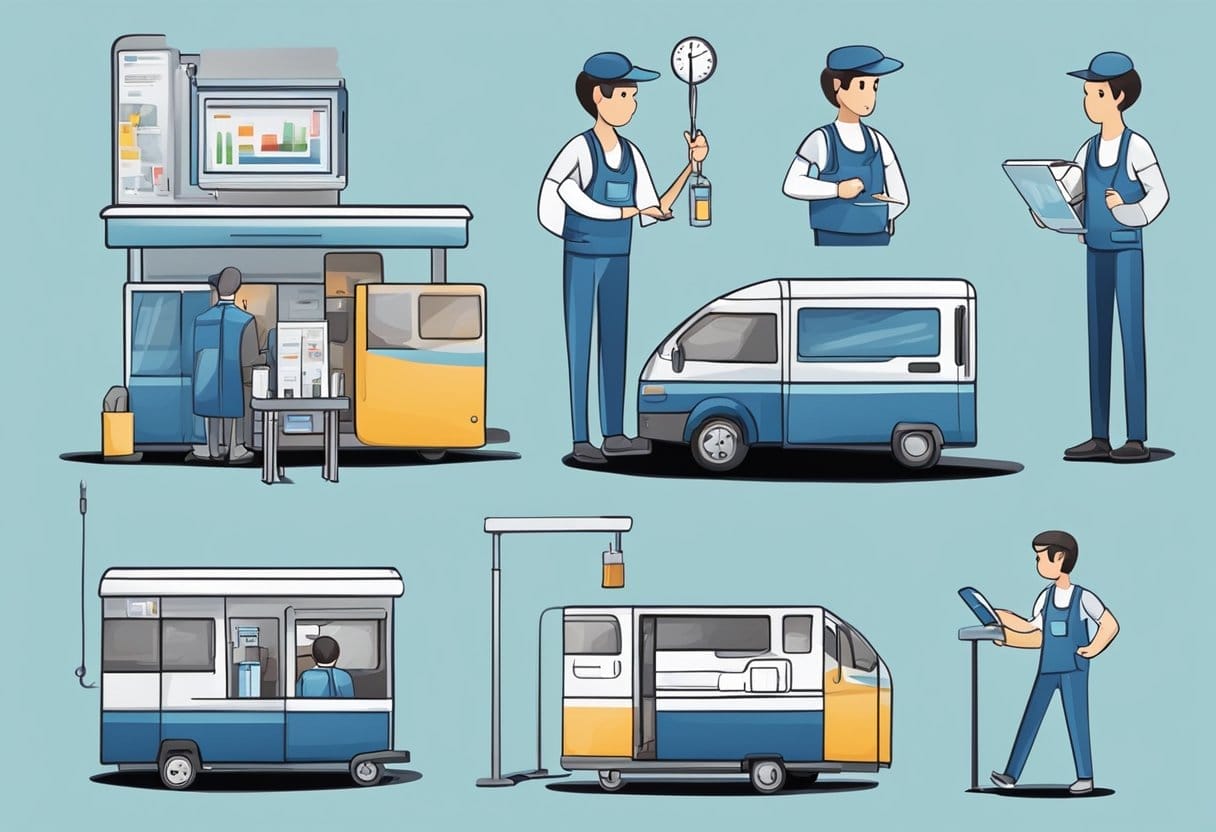
A traveling phlebotomist’s career path requires specialized qualifications and education to ensure the highest level of competence. Seeking opportunities as a travel phlebotomist involves understanding where and how to find job postings tailored to your expertise. By pursuing this career, you’ll discover the potential to receive competitive compensation and benefits.
Moreover, the job offers distinct advantages such as expansive networking opportunities, professional growth, and a dynamic workday that is seldom monotonous. The ongoing demand in the healthcare sector suggests a positive industry outlook for those considering travel phlebotomy jobs.
Key Takeaways
- Travel phlebotomy jobs offer a dynamic environment with the autonomy to work in various clinical settings.
- Pursuing a career in travel phlebotomy requires specific education and qualifications for success.
- The role provides significant career benefits, including competitive compensation and opportunities for professional development.
Understanding Travel Phlebotomy
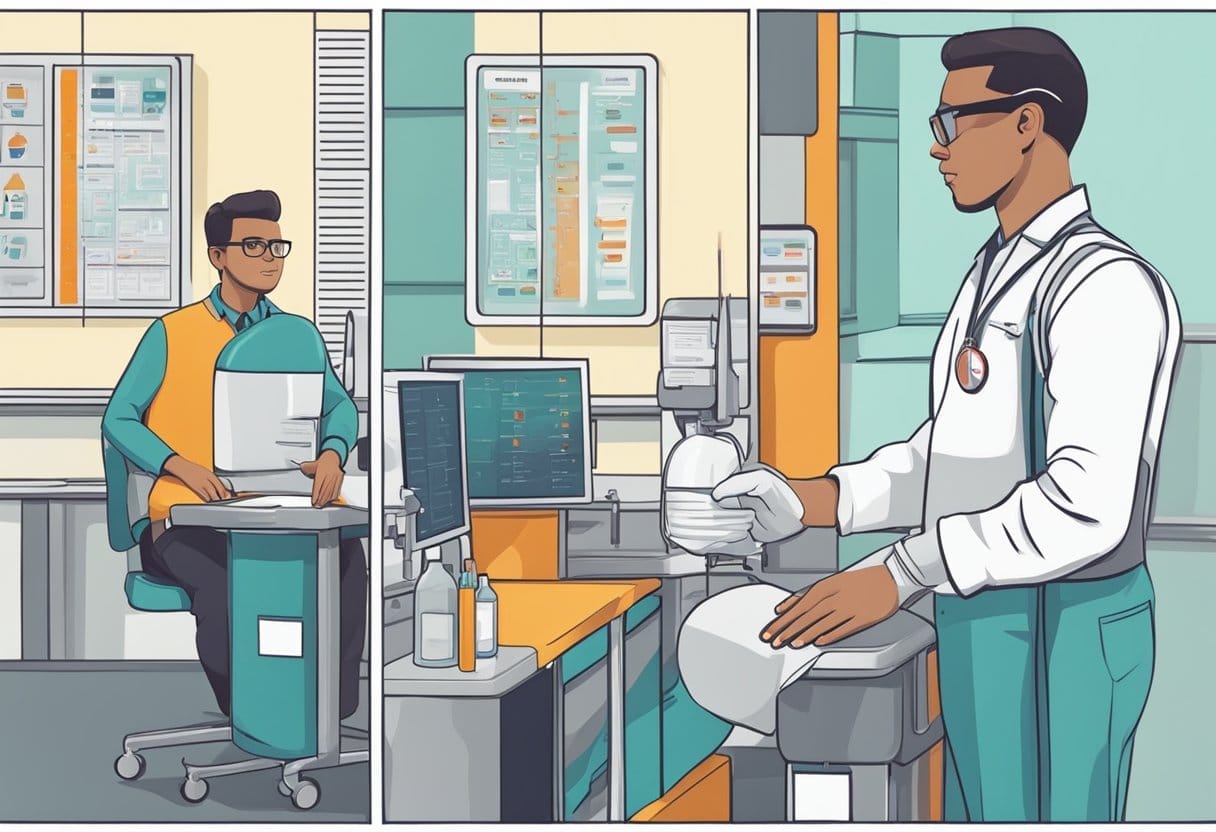
As you explore the world of travel phlebotomy, it’s vital to grasp the unique aspects of this career path. Here, you’ll find clarity on what a travel phlebotomist does and the various settings in which they work.
Defining the Role of a Travel Phlebotomist
A travel phlebotomist is similar to their stationary counterparts but with a significant twist: mobility. Your primary responsibility involves traveling to different locations to collect blood samples from patients. This can range from home health scenarios to facilities requiring your expertise temporarily.
- Mobility: Travel to new locations for work assignments.
- Blood Draws: Perform venipunctures to collect blood specimens.
- Patient Interaction: Provide care and clear instructions to patients during procedures.
Work Environments and Duties
As you delve into the role, you’ll hopefully find many jobs you want. Each setting gives you the best chance to display your adaptability and skill.
- Hospitals: Work on call or for set periods as part of a dynamic medical team.
- Clinics: Support local healthcare staffing during busy periods or cover for staff shortages.
- Home Health: Visit patients in their homes for convenience and personalized care.
Your duties consistently involve the proper identification of patients, accurate labeling of specimens, and meticulous adherence to safety protocols. Above all, your ability to accept travel assignments allows you to serve diverse communities while broadening your professional experience.
Phlebotomist Technician Qualifications and Education

To embark on a career in travel phlebotomy, you must meet specific educational and certification requirements. Your adherence to compliance standards and participation in continuing education are crucial for career advancement.
Required Certifications
Certifications: You must obtain a national certification such as the Certified Phlebotomy Technician (CPT) from organizations like the National Healthcareer Association (NHA) or a similar credential. These certifications typically require successfully completing an accredited phlebotomy program and passing a certification exam.
- National Healthcareer Association
- American Society for Clinical Pathology
- American Medical Technologists
Continuing Education and Clinical Ladder Program
Clinical Ladder Program: A Clinical Ladder Program promotes skill enhancement and professional growth. Participation in such programs can benefit your career trajectory as they often include:
- Mandatory continuing education units (CEUs)
- Advanced certifications
- Specialized training opportunities
Continuing Education: To maintain your phlebotomy certification, you must continue education through workshops, seminars, or college courses to stay updated with the latest best practices.
Mobile Phlebotomy Licensing and Compliance
Licensing: While not all states require a phlebotomist license, checking and fulfilling your specific state’s requirements is essential. States such as California and Nevada have their licensure prerequisites.
Compliance: Your role requires strict adherence to health care regulations, including the Occupational Safety and Health Administration (OSHA) standards and the Health Insurance Portability and Accountability Act (HIPAA) guidelines for patient privacy. Compliance with these regulations protects you and ensures safe practice.
Finding Travel Phlebotomist Jobs
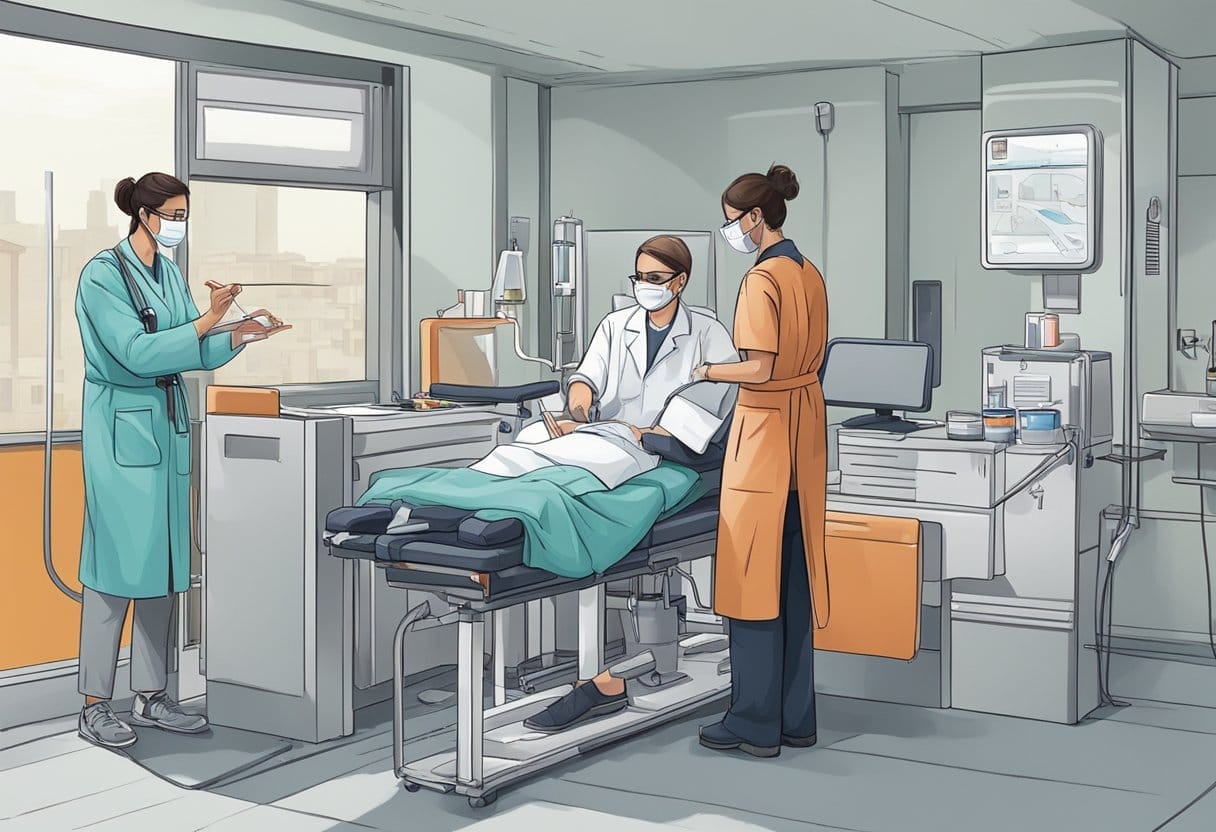
As a phlebotomist, securing travel jobs requires understanding the resources and strategies that open doors to exciting opportunities across various facilities.
Recruiter Assistance and Support System
Partnering with a recruiter can provide a robust support system, essential for navigating the complexities of travel phlebotomist jobs. Recruiters have insider knowledge about current job openings and can facilitate introductions to healthcare facilities. They offer guidance on credentialing and state requirements, which is invaluable when moving between states.
- Assistance: Recruiters can help tailor your resume to be more appealing for travel positions.
- Support: A good recruiter will be your advocate and adviser, offering ongoing support throughout your assignments.
Navigating Medical Assistant Job Databases
Utilizing a job database is key in finding travel phlebotomist jobs. With an array of filters, you can search for positions based on location, duration, and pay rate.
- Online Platforms: Websites like Indeed, Glassdoor, and LinkedIn have sections dedicated to healthcare positions.
- Specialized Databases: Search job databases for travel healthcare professionals to find targeted listings.
Benefits of Direct Facility Relationships
Establishing direct facility relationships can lead to repeat assignments and a personal connection that often translates into preferential rates and assignments.
- Networking: By working directly with facilities, you can create a network of contacts that may result in job leads.
- Contract Terms: Direct negotiations can offer better contract terms, as there is no third-party involvement.
Building relationships and leveraging the right tools are critical steps to launching a successful career in travel phlebotomy.
Benefits and Compensation

Travel phlebotomists enjoy a range of benefits and competitive salaries that reflect the unique demands of their profession. The compensation packages often include impressive health benefits and retirement plans, ensuring both short-term needs and long-term goals are covered.
Understanding Competitive Salary
Your salary as a travel phlebotomist is influenced by experience, location, and the employing agency. On average, a travel phlebotomist’s salary ranges from $30,000 to $50,000 annually, with the potential for additional bonuses and higher pay rates in certain regions. Moreover, most employers offer travel stipends or housing allowances to ensure you’re compensated for your mobility.
Health and Welfare Benefits
The comprehensive health and welfare benefits package is a key advantage of travel phlebotomy jobs. Standard benefits often include:
- Health Insurance: Comprehensive coverage that may include medical, dental, and vision plans.
- Life Insurance: Financial security for your beneficiaries in unforeseen circumstances.
- Sick Leave: Paid time off to recover from illness without financial strain.
Note: Benefit offerings may vary by employer.
Retirement and Savings Plans
Future financial security is crucial, and as a travel phlebotomist, you will have access to various retirement and savings plans such as:
- 401(k) Plans: Many employers offer 401(k) retirement savings plans with a range of investment options.
- 401(k) Match: Some employers match your contributions to a certain percentage, effectively doubling part of your retirement savings.
Remember to review the specific details of each plan, as they can significantly impact your financial well-being in the long run.
Career Advantages
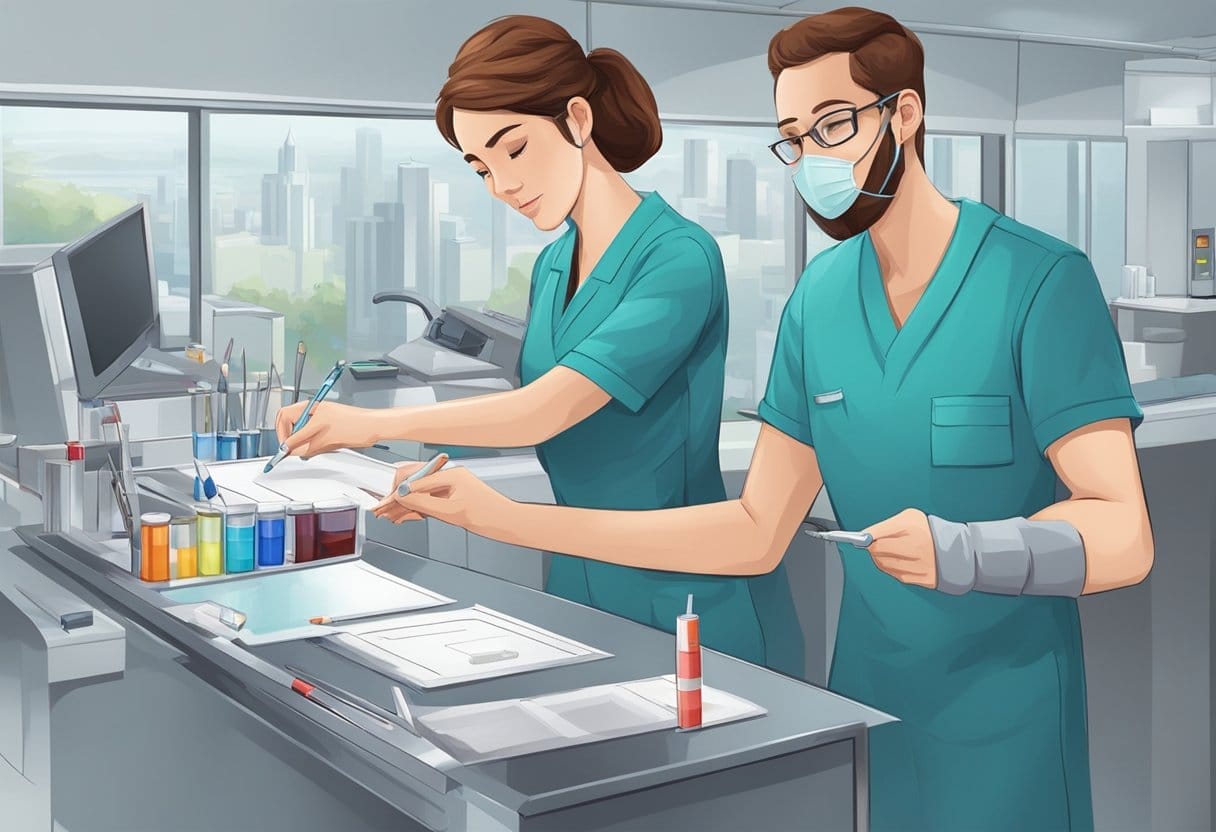
Travel phlebotomy jobs offer several career advantages that can align with your professional and personal growth aspirations.
Flexibility and Work-Life Integration
In travel phlebotomy, you have the power to choose when and where you work. This flexibility can lead to a better work-life balance. You can opt for per diem positions that allow you to select shifts that fit your schedule or secure permanent placements that offer consistent hours.
- Per Diem: Choose work days that fit your life.
- Permanent: Enjoy regular hours and stability.
Skill Building and Professional Development
Your career in travel phlebotomy fosters a continuous learning environment. Each new location or facility offers unique challenges and patient demographics, thus broadening your skillset. This exposure benefits professional development and may include handling different diseases and donation procedures.
- Diverse Disease Exposure: Gain experience from various health conditions.
- Advanced Techniques: Learn new procedures related to blood collection and handling.
Relocation Opportunities and Lifestyle Choices
Travel phlebotomy can be a gateway to relocation opportunities. If you desire to explore new regions or communities, your job can take you there. This could be a temporary assignment or a pathway to a permanent role in a new location. The choice is yours, allowing for a career that adapts to your lifestyle choices.
- New Regions: Discover and work in different cities or states.
- Lifestyle Alignment: Match your job location with your desired way of living.
Industry Outlook
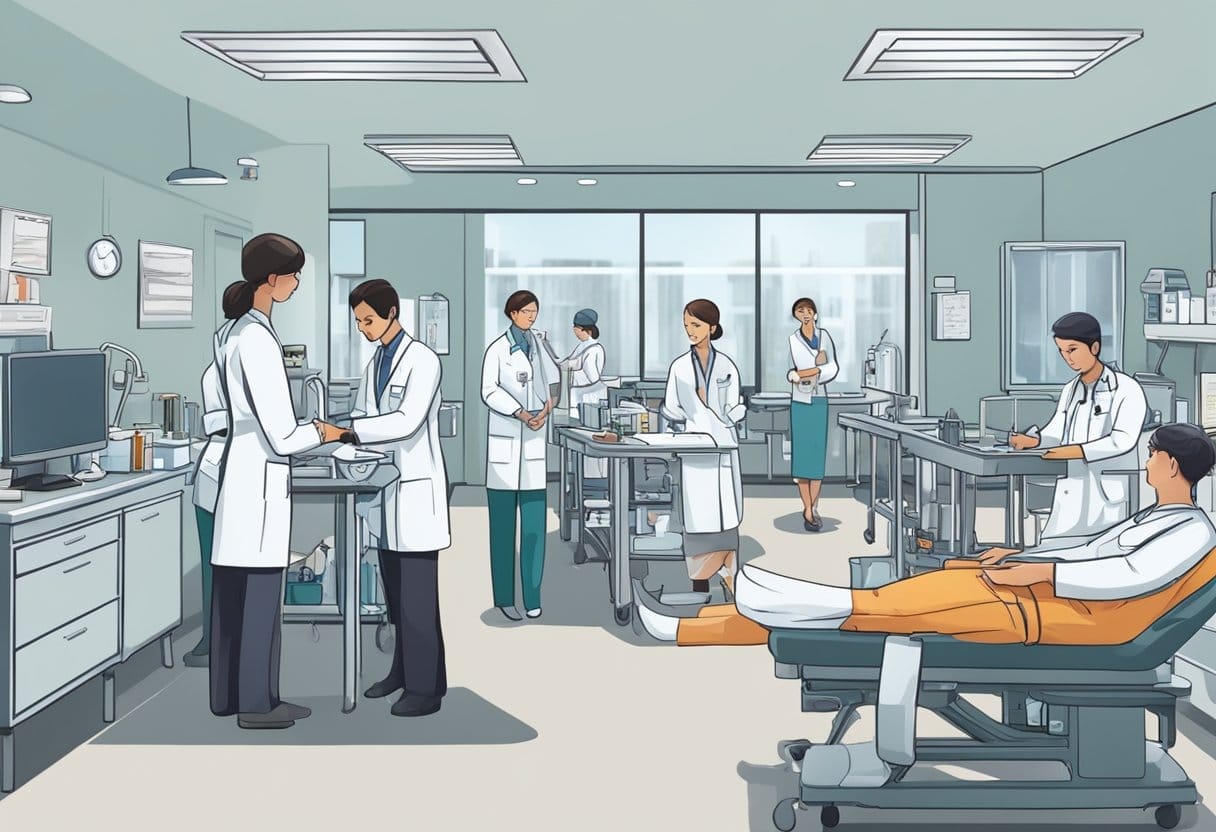
As a travel phlebotomist, your career prospects are influenced by trends in healthcare and the demand for medical testing.
Job Market and Projections
According to the Bureau of Labor Statistics (BLS), employment opportunities for phlebotomists are projected to grow much faster than average for all occupations through the coming years. This growth trend suggests that you will likely encounter a favorable job market. Hospitals and healthcare facilities consistently require skilled phlebotomists to draw blood and contribute to patient care.
- Projected Growth Rate (2019-2029): 17% (Much faster than average)
- Employment Settings:
- Hospitals
- Diagnostic Laboratories
- Blood Donor Centers
- Other Healthcare Facilities
Impact of Healthcare Trends on Phlebotomy
Healthcare trends have a significant impact on the field of phlebotomy. An aging population requires more healthcare services, leading to a rise in medical testing and, in turn, the need for phlebotomy services. As a travel phlebotomist, you’ll find that your role adapts depending on locations and prevailing health conditions. Technology advancements also shape your work by introducing new testing methods and requirements.
- Key Factors:
- Increasing demand for medical testing
- The advent of new medical technologies
- Expansion of healthcare services to rural and underserved areas
Your expertise in phlebotomy is needed and valued across various healthcare paradigms, with travel phlebotomist work offering diverse opportunities to practice your skill set in different environments.
Working With Patients
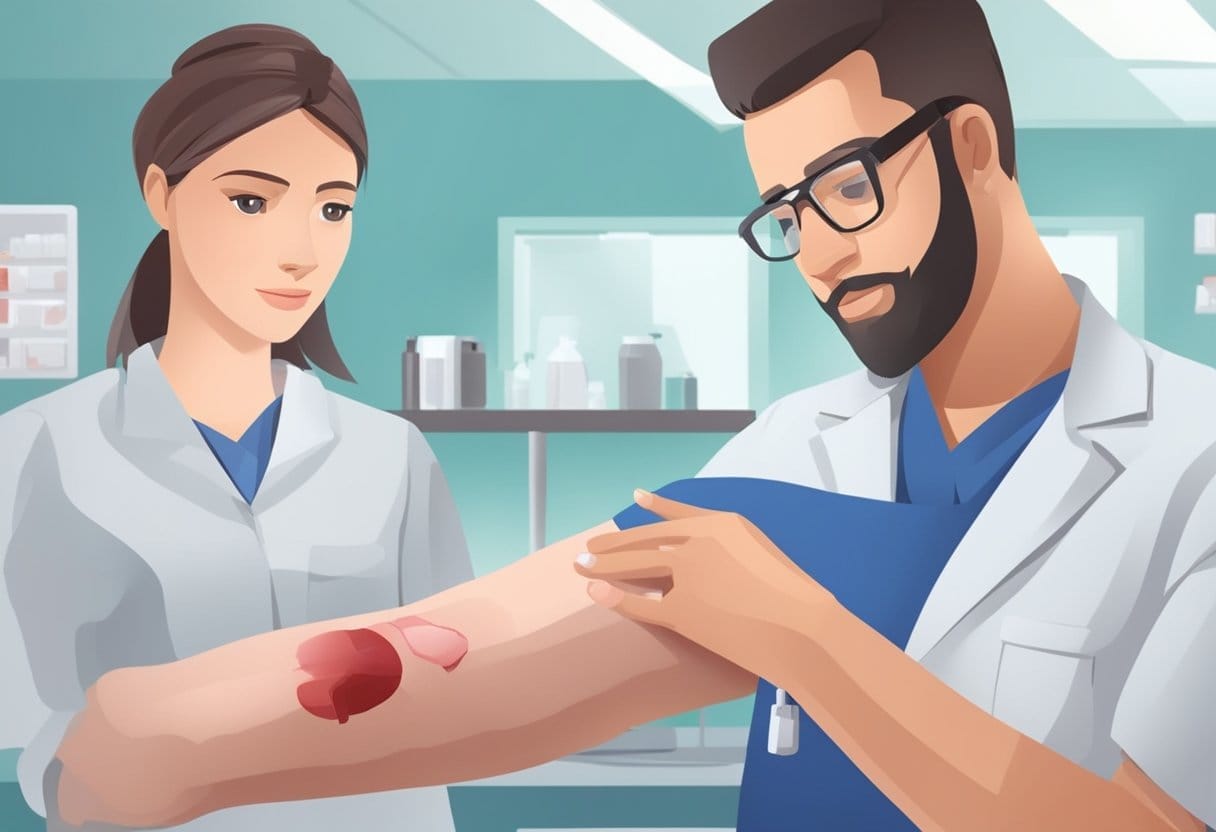
When working with patients, your main objectives are to prioritize their comfort and ensure the integrity of the blood samples collected. Communication skills are key in establishing rapport and trust.
Patient Care and Communication
As a travel phlebotomist, you interact directly with a diverse patient population. Adaptability and empathy are vital in this role. You need to:
- Clearly explain the blood draw process to your patients to alleviate any concerns.
- Be attentive to individual patient needs and preferences during specimen collection.
Handle specimens responsibly to preserve the quality of the blood samples for accurate testing results.
Safety Protocols and Ethical Considerations
You must adhere to strict safety protocols:
- Always wear appropriate personal protective equipment (PPE).
- Follow correct procedures for needle disposal.
Your ethical considerations include maintaining patient confidentiality and obtaining informed consent before collecting blood samples. By following these guidelines, you protect both the well-being of your patients and the integrity of the specimens.
Travel Phlebotomy Jobs Recap
In conclusion, travel phlebotomy jobs offer healthcare professionals a unique and rewarding opportunity to combine their passion for patient care with a love for exploration and adventure. The ability to work in diverse healthcare settings while experiencing new cultures and environments can provide valuable professional and personal growth.
With the increasing demand for phlebotomy services across different regions, travel phlebotomy jobs present a promising avenue for those seeking a dynamic and fulfilling career in the healthcare industry.
Frequently Asked Questions
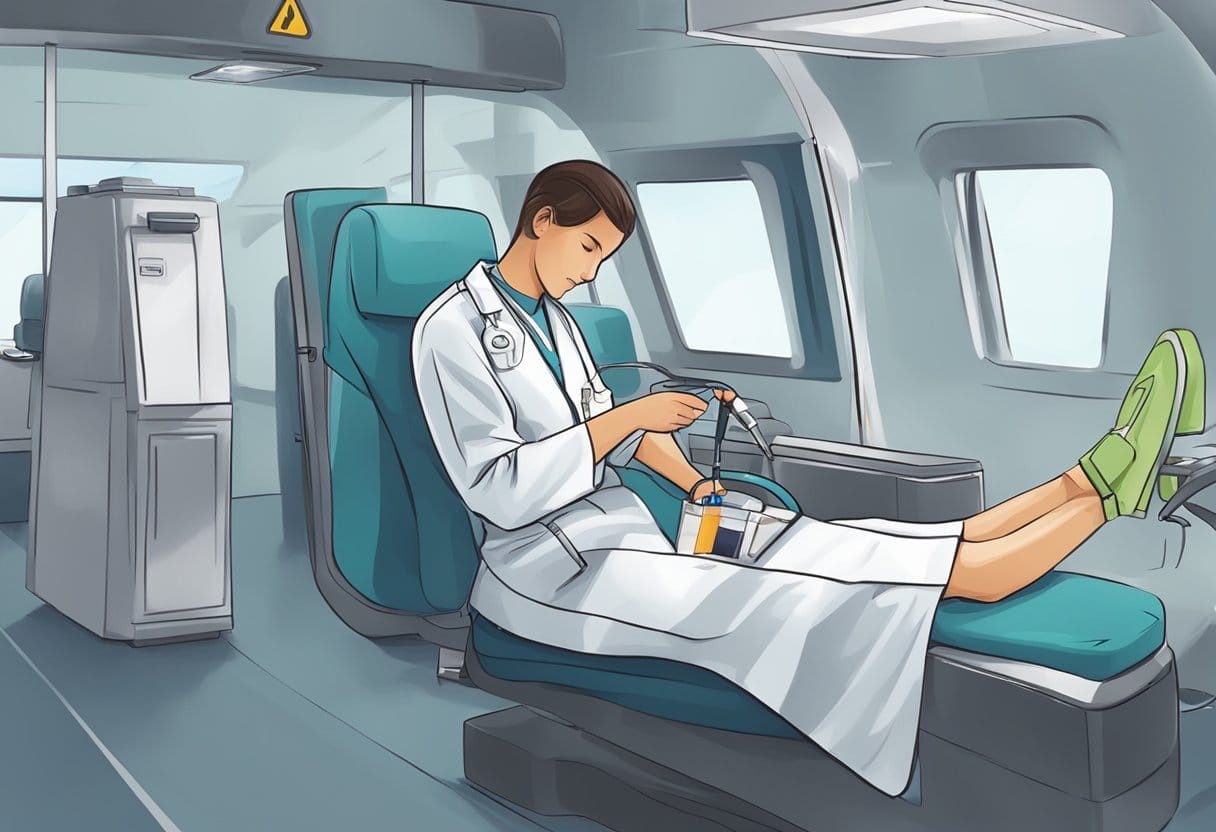
Whether you’re looking to broaden your horizons or seeking a unique employment path in phlebotomy, understanding the landscape of travel phlebotomy jobs is essential. These FAQs give you insights into qualifications, pay variations, strategic benefits, and contract specifics about your career mobility in this field.
What qualifications are necessary for securing international travel phlebotomy positions?
To secure international travel phlebotomy positions, you will generally need a combination of certification from a recognized phlebotomy program and proven work experience. Additional requirements may include language proficiency and compliance with specific healthcare regulations of the destination country.
How do salary ranges compare for travel phlebotomists in regions such as California?
Travel phlebotomists in California often command higher salaries than other regions due to the state’s cost of living and demand for healthcare services. Expect variations in pay based on city-specific needs, experience, and the terms of your contract.
What are the benefits of working with a phlebotomist staffing agency for travel positions?
Working with a staffing agency can provide benefits such as streamlined job searches, negotiation of competitive salaries, and assistance with travel logistics. Agencies often offer support with licensure and continuing education, which is vital for maintaining professional qualifications.
Which companies are known for offering the best benefits for traveling phlebotomists?
Companies such as Aureus Medical Group, Cross Country Medical Staffing Network, and American Mobile Healthcare are known to offer comprehensive benefit packages for traveling phlebotomists, including health insurance, retirement plans, and housing stipends.
What are the standard contract terms for travel phlebotomist jobs?
Common contract terms include the duration of assignment, typically 8 to 13 weeks, on-call requirements, guaranteed hours, and stipulations regarding travel and housing arrangements. Always review your contract carefully to understand cancellation policies and overtime pay.
How can a phlebotomist determine the best locations with high service demand?
To identify high-demand locations, you should research areas with a current shortage of healthcare professionals, consult with staffing agencies regarding market trends, and consider destinations that historically offer higher pay or require specialized skills where you may have an advantage.
